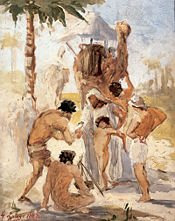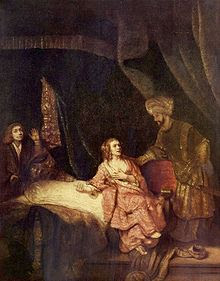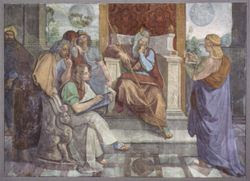Joseph, son of Jacob, is one of the best-known figures in the Torah, famous for his coat of many colors (although this may be a mistranslation of the Hebrew word for "stripes") and his God-given ability to interpret dreams. Due to jealousy, his brother Judah sold him into slavery for 20 pieces of silver. Eventually he worked under the Egyptian official Potiphar, but was freed and became the chief adviser (vizier) to the Egyptian Pharaoh, allegedly during either the Hyksos Era or, according to Kenneth Kitchen, the Middle Kingdom of Egypt.
The shrine called Joseph's Tomb in Nablus/Shechem is traditionally considered to be his tomb.
The eleventh son of Jacob and the elder of the two sons of Rachel was born at Haran.
The meaning given to the name (l.c.) is "shall add": "The Lord shall add to me another son." It seems probable, however, it has God as its first element, and is a contraction, the original form being "Jehoseph", while in Gen. xxx. 23 there is an allusion to the connection of "Joseph".
Upon Joseph centered the love of his father, Jacob, who showered upon "the son of his old age" many tokens of special favor, and arrayed him in a "coat of many colors". This favoritism, however, excited the envy of his older brothers, and Joseph increased their envy by telling them of two dreams which prognosticated his ruling over them (Gen. xxxvii. 2-11).
Sunday, March 15, 2009
 When a lad of seventeen, Joseph was sent by his father to inquire after his brothers, who were pasturing the flocks in Shechem. He found them at Dothan, and when his brothers saw him approaching they planned to kill him. Reuben, however, took his part, and, in order to remove him from the fury of the others, advised them to throw Joseph into a pit (Gen. xxxvii. 13-24). He intended to rescue Joseph and return him to Jacob later.
When a lad of seventeen, Joseph was sent by his father to inquire after his brothers, who were pasturing the flocks in Shechem. He found them at Dothan, and when his brothers saw him approaching they planned to kill him. Reuben, however, took his part, and, in order to remove him from the fury of the others, advised them to throw Joseph into a pit (Gen. xxxvii. 13-24). He intended to rescue Joseph and return him to Jacob later.Detailed accounts are given of the sale of Joseph, which immediately followed; according to one, the brothers, while eating at some distance from the pit, sighted a caravan of Ishmaelites, to whom they decided to sell Joseph. In the meantime some Midianite merchants passing the pit drew Joseph out and sold him for twenty pieces of silver to the Ishmaelites, who took Joseph to Egypt (Gen. xxxvii. 25 - 28 ). The last statement is repeated in Gen. xxxix. 1, while in Gen. xxxvii. 36 it is said that the Midianites (Hebr. "Medanites") sold him to Potiphar in Egypt. Midianites and Ishmaelites are interchangeable terms.
The evidence of Judges 8:24 is especially telling. The condition of being an Ishmaelites is associated with the wearing of a golden earring. This suggests that "Ishmaelites" was not a racial connotation, but a material one. It may be suggested that because Ishmael was a wanderer in the desert, the name was attached to those who were vagrant wanderers with no home base, as might attach themselves to trade caravans for protection.
Imprisonment
 Joseph Accused by Potiphar's Wife,
Joseph Accused by Potiphar's Wife,In Potiphar's house Joseph fared well, for, seeing that he prospered in all that he did, his impressed master appointed him superintendent of his household. But Joseph was "a goodly person and well favored", and his master's wife conceived a passion for him. Her repeated advances being repulsed, she finally attempted compulsion; still failing, she brought a false accusation against him before her husband, and Joseph was thrown into prison.
There, too, God was with Joseph; the keeper of the prison, seeing that he could place confidence in him, committed the other prisoners to his charge (Gen. xxxix.).Soon afterward, two of Pharaoh's officers, the chief butler and the chief baker, having offended the king, were thrown into the prison where Joseph was, and Joseph was appointed to serve them.
One morning both officers told Joseph their dreams of the previous night, which they themselves were unable to interpret. Joseph concluded from their dreams that the chief butler would be reinstated within three days and that the chief baker would be hanged. Joseph requested the chief butler to mention him to Pharaoh and secure his release from prison, but that officer, reinstalled in office, forgot Joseph (Gen. xl.).
Joseph remained two years in prison, at the end of which period Pharaoh had an uneasy dream of seven lean kine devouring seven fat kine on the Nile, and of seven withered ears devouring seven full, ripe ears. Great importance was attached to dreams in Egypt, and Pharaoh was much troubled when his magicians proved unable to interpret them satisfactorily.
Then the chief butler remembered Joseph and spoke of his skill to Pharaoh. Accordingly he was sent for, and he interpreted Pharaoh's dream as foretelling that seven years of abundance would be followed by seven years of famine and advised the king to appoint some able man to store the surplus grain during the period of abundance. Pleased with his interpretation, Pharaoh made him viceroy over Egypt, giving him the Egyptian name of Zaphnath-paaneah and conferring on him other marks of royal favor.
Shortly afterwards, Joseph was married by Pharaoh to Asenath, the daughter of Potipherah, priest of On, through whom he soon had two sons, Manasseh and Ephraim (Gen. Xli. 1-52).
Viceroy of Egypt
 During the seven years of abundance, Joseph amassed for the king a great supply of grain, which he sold to both Egyptians and foreigners (Gen. xli. 48-49, 54-57). The famine, having extended to all the neighboring countries, caused Joseph's brothers, with the exception of Benjamin, to go to Egypt in search of wheat. Joseph recognized his brothers, who prostrated themselves before him and therein fulfilled, in part, his dreams. He received them roughly and accused them of being spies, thereby compelling them to give him information about their family.
During the seven years of abundance, Joseph amassed for the king a great supply of grain, which he sold to both Egyptians and foreigners (Gen. xli. 48-49, 54-57). The famine, having extended to all the neighboring countries, caused Joseph's brothers, with the exception of Benjamin, to go to Egypt in search of wheat. Joseph recognized his brothers, who prostrated themselves before him and therein fulfilled, in part, his dreams. He received them roughly and accused them of being spies, thereby compelling them to give him information about their family.Desiring to see Benjamin, Joseph demanded that they substantiate their statements by sending one of their number for Benjamin while the others remained behind. He accordingly imprisoned them for three days, and then sent them away with wheat, retaining Simeon as a hostage (Gen.xlii. 1-25).
The famine in Canaan continuing, Jacob was again obliged to send his sons to Egypt for corn. As Joseph had commanded them not to appear before him again without Benjamin, Jacob was compelled to let Benjamin go with them. He sent also a present to Joseph in order to win his favor, together with the money which had been, by Joseph's orders, put into their sacks.
Note: Please search the blog archive for the continuation.
Revelation to brothers
The second time Joseph received them very kindly and prepared a feast for them, but paid special attention to Benjamin (Gen. xliii.). Desiring to know what his brothers would do if under some pretext he retained Benjamin, Joseph gave orders to fill their sacks with corn, put their money into their sacks, and put his silver goblet in Benjamin's. On the following morning the brothers departed, but before they had gone far a messenger overtook them, accusing them of stealing the goblet. The messenger searched their sacks and found the goblet in Benjamin's sack; this compelled them to return.
Joseph reproached them for what they had done, and Judah, speaking on behalf of his brothers, expressed their willingness to remain as slaves to Joseph. The latter, however, declined their offer, declaring that he would retain Benjamin only (Gen. xliv. 1-17).
Overcome by Judah's eloquent appeal (Gen. xliv. 18-34) and convinced of his brothers' repentance, Joseph disclosed himself to them. He inquired after his father, but as they were too much amazed and startled to answer him, he assured them that in treating him as they did they had been carrying out the will of God. He then urged them to return home quickly, loaded them with presents for his father, and supplied them with vehicles for the transportation of the whole family (Gen. xlv.).
Joseph met his father in the Land of Goshen. He recommended his brothers to represent themselves as shepherds so that they might remain in Goshen unmolested. Then he presented five of his brothers to Pharaoh, who granted them a domain in Goshen; and, after having introduced Jacob to Pharaoh, Joseph domiciled the whole family, at Pharaoh's command, "in the land of Ramesses", where he supplied them with all they needed (Gen. xlvi. 29-xlvii. 12).
As a ruler, Joseph changed the system of land-tenure in Egypt. The famine being severe, the people first expended all their money in the purchase of corn, then they sold their cattle, and finally gave up their land. Thus all the cultivated land in Egypt, except that of the priests, became the property of the crown, and the people farmed it for the king, giving him one-fifth of the produce (Gen. xlvii. 14-26).
Hearing of his father's sickness, Joseph went to him with his two sons, whom Jacob blessed, conferring upon Joseph at the same time one portion more than the portions of his brothers (Gen. xlviii.). Joseph carried Jacob's remains to the land of Canaan, where he gave them stately burial. His brothers, fearing that he had only been waiting until after their father's death to avenge himself upon them, sent to implore his forgiveness. Joseph allayed their fears and promised that he would continue to provide for their wants.
He lived to the age of one hundred and ten, and saw his great-grandchildren grow up. Before his death, he made the children of Israel take an oath that when they left the land of Egypt they would take his bones with them. His body was embalmed and placed temporarily in a coffin. At the Exodus his bones accompanied Moses, and were finally buried in Shechem (Gen. l. 25; Ex. xiii. 19; Josh. xxiv. 32).
Joseph reproached them for what they had done, and Judah, speaking on behalf of his brothers, expressed their willingness to remain as slaves to Joseph. The latter, however, declined their offer, declaring that he would retain Benjamin only (Gen. xliv. 1-17).
Overcome by Judah's eloquent appeal (Gen. xliv. 18-34) and convinced of his brothers' repentance, Joseph disclosed himself to them. He inquired after his father, but as they were too much amazed and startled to answer him, he assured them that in treating him as they did they had been carrying out the will of God. He then urged them to return home quickly, loaded them with presents for his father, and supplied them with vehicles for the transportation of the whole family (Gen. xlv.).
Joseph met his father in the Land of Goshen. He recommended his brothers to represent themselves as shepherds so that they might remain in Goshen unmolested. Then he presented five of his brothers to Pharaoh, who granted them a domain in Goshen; and, after having introduced Jacob to Pharaoh, Joseph domiciled the whole family, at Pharaoh's command, "in the land of Ramesses", where he supplied them with all they needed (Gen. xlvi. 29-xlvii. 12).
As a ruler, Joseph changed the system of land-tenure in Egypt. The famine being severe, the people first expended all their money in the purchase of corn, then they sold their cattle, and finally gave up their land. Thus all the cultivated land in Egypt, except that of the priests, became the property of the crown, and the people farmed it for the king, giving him one-fifth of the produce (Gen. xlvii. 14-26).
Hearing of his father's sickness, Joseph went to him with his two sons, whom Jacob blessed, conferring upon Joseph at the same time one portion more than the portions of his brothers (Gen. xlviii.). Joseph carried Jacob's remains to the land of Canaan, where he gave them stately burial. His brothers, fearing that he had only been waiting until after their father's death to avenge himself upon them, sent to implore his forgiveness. Joseph allayed their fears and promised that he would continue to provide for their wants.
He lived to the age of one hundred and ten, and saw his great-grandchildren grow up. Before his death, he made the children of Israel take an oath that when they left the land of Egypt they would take his bones with them. His body was embalmed and placed temporarily in a coffin. At the Exodus his bones accompanied Moses, and were finally buried in Shechem (Gen. l. 25; Ex. xiii. 19; Josh. xxiv. 32).
Blessing
Jacob, before he died, blessed all his sons and included blessings for Joseph's sons. He first blessed Joseph's sons, Ephraim and Manasseh. Though Manasseh was the older brother, Jacob blessed Ephraim with a greater ambition than his older brother.
He then gave his blessing upon all his sons. Though he blessed them in order by their age, the blessing he gave Joseph was greater than the others:
'Joseph is a fruitful tree by a spring, whose branches climb over the wall. The archers savagely attacked him, shooting and assailing him fiercely, but Joseph's bow remained unfailing and his arms were tireless by the power of the Strong One of Jacob, by the name of the Shepherd of Israel, by the God of your father--so may he help you! By God Almighty--so may he bless you with the blessings of heaven above, and the blessings of the deep that lies below! The blessings of breast and womb and the blessings of your father are stronger than the blessings of the eternal mountains and the bounty of the everlasting hills. May they rest on the head of Joseph, on the brow of him who was prince among his brother.' (Genesis 49:22-26)
He then gave his blessing upon all his sons. Though he blessed them in order by their age, the blessing he gave Joseph was greater than the others:
'Joseph is a fruitful tree by a spring, whose branches climb over the wall. The archers savagely attacked him, shooting and assailing him fiercely, but Joseph's bow remained unfailing and his arms were tireless by the power of the Strong One of Jacob, by the name of the Shepherd of Israel, by the God of your father--so may he help you! By God Almighty--so may he bless you with the blessings of heaven above, and the blessings of the deep that lies below! The blessings of breast and womb and the blessings of your father are stronger than the blessings of the eternal mountains and the bounty of the everlasting hills. May they rest on the head of Joseph, on the brow of him who was prince among his brother.' (Genesis 49:22-26)
Subscribe to:
Posts (Atom)





